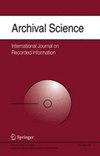While archival user studies have largely focused on humanities (and adjacent) scholars, this paper focuses on anthropologists engaged in scientific research. Based on qualitative results from an open-ended survey, we investigate how science-based anthropologists perceive and use archives in their work. We ask: How are science-based anthropologists and archaeologists reusing archival data in their research? What difficulties or barriers do they encounter in reusing archival data in scientific contexts? What attitudes or understandings about archival research are held by science-based anthropologists and archaeologists? Our findings primarily add to the body of literature about user experience in archives and more broadly to the emerging literature on archival data reuse. Major findings include (1) barriers and gatekeeping legacies that impact archival research and the ability of researchers to reuse data and (2) mixed perceptions about archives among researchers. We also discuss suggestions made by these communities of practice, and the ways that barriers to archival data reuse may stem from a lack of knowledge about core archival and information infrastructures among researcher communities. Together, this research showcases possible (re)uses of important primary source data in archives among scientific communities but highlights that barriers to access and misperceptions create a gap in exploiting that potential. We argue for a “re-imagining” of anthropological archives as relevant to contemporary communities and scientific pursuits toward a richer scientific research environment.


